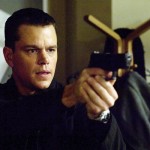3. Best Soundtrack That Was Perfect But Which No One Remembers
Yes, I’m still on music. Yes, it’s an obsession of mine. And yes, Carter Burwell’s work on No Country for Old Men is amazing: moody, sonically unpredictable, unsettling; even terrifying. So, a perfect fit for its film. Oh, and also, no one recognizes it. There’s very little of it, really — only 16ish terrifying minutes — which means it’s far less ubiquitous than the music that accompanies the vast majority of films. Plus, it’s just hard to pin down, melodically. It’s a mood, really. Perhaps best described it as “A Perfect Musical Match for Roger Deakin’s Brilliant, Non-Winning Cinematography.” (Oops. There I go again.)
Here’s Burwell:
The film is the quietest I’ve worked on. Often there is no sound but wind and boots on hard caliche or stocking feet on concrete. Then sporadically there are shootouts involving an unknown number of shooters with shotguns and automatic weapons. It was unclear for a while what kind of score could possibly accompany this film without intruding on this raw quiet. I spoke with the Coens about either an all-percussion score or a melange of sustained tones which would blend in with the sound effects – seemingly emanating from the landscape. We went with the tones.
The all-percussion score sounds like fun, and I look forward to doing it some day, but it is a cliche to have drums accompany “action” and this sound immediately pulled the film back into familiar territory. The sustained tones, however, kept the film unsettled. Skip Lievsay, the sound editor, and I spoke early about these approaches and he sent me some examples of processed sound effects just as I sent him examples of tone compositions, mostly sine and sawtooth waves and singing bowls. The effect is that the music comes out of and sinks back into the sound effects in a hopefully subliminal manner.
And here’s a pretty accurate description of Burwell’s work from the NY Times’ article on the film’s sound, “Exploiting Sound, Exploring Silence.” (I especially like the way it notes the humbleness of creating a score so designed to be unnoticed.
His work on “No Country for Old Men” is by some measure the most self-effacing of his career. (“My self couldn’t be any more effaced,” he said, laughing.) Including end credits, there are a mere 16 minutes of music in the film. But after learning that it meets eligibility requirements (he initially assumed it didn’t), Mr. Burwell has submitted it for Oscar consideration, partly at the request of the distributor, Miramax, and partly, he joked, “to stand up for all the minimal scores in the world.”
Runner up? Steven Price’s score for Gravity. I know it had a huge impact on the emotional and visceral experience. But it’s really hard for me to remember on its own. (Oh, and also, it actually won. But still, I find it difficult to underestimate its value to that film, and just as difficult to recall. Even the cathartic finale.)










